Keitum / Kairem / Keitum auf Sylt / Kejtum / Keltum
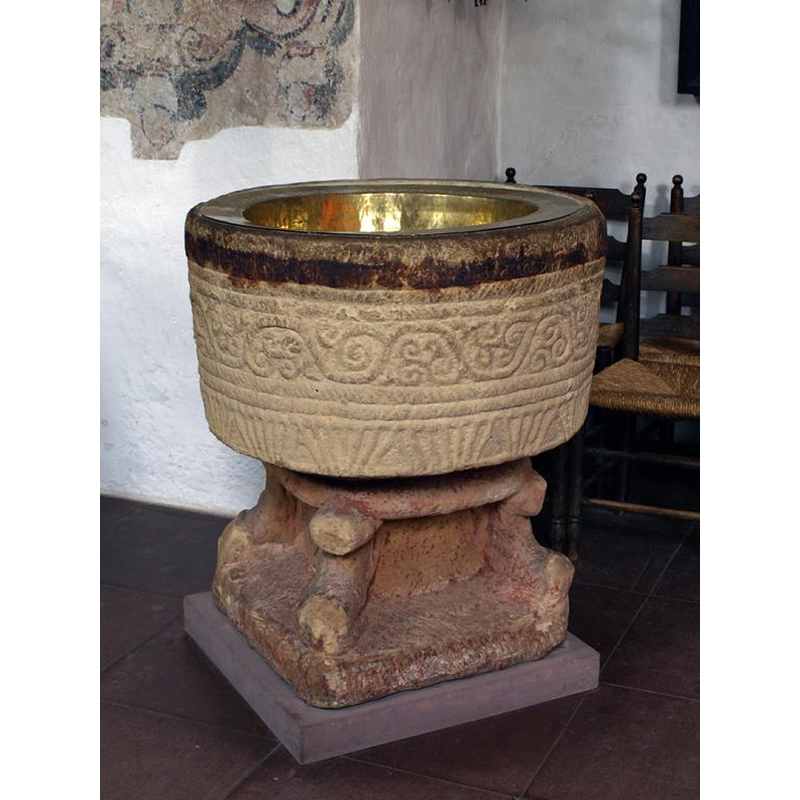
Image copyright © Uwe Barghaan, 2008
CC-BY-SA-3.0
Results: 11 records
view of font
Copyright Statement: Image copyright © Uwe Barghaan, 2008
Image Source: digital photograph taken 24 October 2008 by Uwe Barghaan [http://commons.wikimedia.org/wiki/File:Keitum_Kirche_Taufe.jpg] [accessed 6 July 2014]
Copyright Instructions: CC-BY-SA-3.0
view of font
design element - motifs - vine - acanthus
Copyright Statement: Image copyright © Uwe Barghaan, 2008
Image Source: digital photograph taken 24 October 2008 by Uwe Barghaan [http://commons.wikimedia.org/wiki/File:Keitum_Kirche_Taufe.jpg] [accessed 6 July 2014]
Copyright Instructions: CC-BY-SA-3.0
design element - motifs - rope moulding - double rope moulding or braid - 2
Copyright Statement: Image copyright © Uwe Barghaan, 2008
Image Source: digital photograph taken 24 October 2008 by Uwe Barghaan [http://commons.wikimedia.org/wiki/File:Keitum_Kirche_Taufe.jpg] [accessed 6 July 2014]
Copyright Instructions: CC-BY-SA-3.0
design element - patterns - fan-frieze
Copyright Statement: Image copyright © Uwe Barghaan, 2008
Image Source: digital photograph taken 24 October 2008 by Uwe Barghaan [http://commons.wikimedia.org/wiki/File:Keitum_Kirche_Taufe.jpg] [accessed 6 July 2014]
Copyright Instructions: CC-BY-SA-3.0
design element - motifs - roll moulding
Copyright Statement: Image copyright © Uwe Barghaan, 2008
Image Source: digital photograph taken 24 October 2008 by Uwe Barghaan [http://commons.wikimedia.org/wiki/File:Keitum_Kirche_Taufe.jpg] [accessed 6 July 2014]
Copyright Instructions: CC-BY-SA-3.0
view of church exterior - southeast view
Copyright Statement: Image copyright © Holger Weinandt, 2006
Image Source: digital photograph taken 23 June 2006 by Holger Weinandt [http://de.wikipedia.org/wiki/Datei:Severinskirche_Keitum.jpg] [accessed 6 July 2014]
Copyright Instructions: CC-BY-SA-3.0
view of church exterior - northwest view
Scene Description: ca. 1900
Copyright Statement: Image copyright © [in the public domain]
Image Source: postcard; W. Monck, Westerland a. Sylt; Zenodot Verlagsgesellschaft mbH [http://commons.wikimedia.org/wiki/File:Sylt_Postkarte_008.jpg] [accessed 6 July 2014]
Copyright Instructions: PD
view of church interior - retable
Copyright Statement: Image copyright © Uwe Barghaan, 2008
Image Source: digital photograph taken 24 October 2008 by Uwe Barghaan [http://commons.wikimedia.org/wiki/File:Keitum_Kirche_Altar.jpg] [accessed 6 July 2014]
Copyright Instructions: CC-BY-SA-3.0
view of church interior - nave - looking east
Scene Description: the font is partially visible at the far [east] end, left [north] side
Copyright Statement: Image copyright © JD, 2008
Image Source: digital photograph taken 17 August 2008 by JD [http://commons.wikimedia.org/wiki/File:Hauptschiff,_St._Severin,_Sylt.JPD] [accessed 6 July 2014]
Copyright Instructions: CC-BY-SA-3.0,2.5,2.0,1.0
animal - mammal - lion - couchant-regardant - 4
Scene Description: very eroded
Copyright Statement: Image copyright © Uwe Barghaan, 2008
Image Source: digital photograph taken 24 October 2008 by Uwe Barghaan [http://commons.wikimedia.org/wiki/File:Keitum_Kirche_Taufe.jpg] [accessed 6 July 2014]
Copyright Instructions: CC-BY-SA-3.0
INFORMATION
Font ID: 02579KEI
Object Type: Baptismal Font1
Font Date: 1230?
Font Century and Period/Style: 13th century (early?), Late Romanesque
Workshop/Group/Artisan: Bentheim font, group Hage A.a. Type I [Drake]
Cognate Fonts: [cf. FontNotes]
Church / Chapel Name: Evangelish-lutherische Dorfkirche St.-Severin / Severinskirche
Font Location in Church: Inside the church, in the chancel, N side
Church Patron Saint(s): St. Severin [aka Seurin, Severinus of Noricum]
Church Notes: church here first documented in 1240, but could be as early as 1216; tower is ca. 1450 and was used as navigation beacon;
Church Address: Munkmarscher Chaussee, 25980 Sylt-Ost, Germany
Site Location: Nordfriesland, Schleswig-Holstein, Germany, Europe
Directions to Site: Keitum is on the island of Sylt, in the extreme NW corner of the Schleswig-Holstein National Park, 3 kms ESE of Westerland. Sylt is connected to the mainland via the Autotransport Westerland-Niebull which runs atop the Hindenburgdamm, right at the Danish border.
Ecclesiastic Region: Bistum Augsburg
Additional Comments: painted font (the base retains some reddish paint traces)
Font Notes:
Click to view
Noted and illustrated in Haupt (1887) as a font made of "roter rheinischer Sandstein", topped with a bronze cover. Sauermann (1904) states that the font is made of two pieces [cf. infra]. Listed in Ligtenberg (1915). Drake (2002) classes this font as Bentheim School, Hage. a. Type I (with fonts at Berum, Forlitz-Blaukirchen, Hage, Kappeln, Keitum, Ohne, Roden, Westochtersum and Wesuwe); Drake (ibid.) further notes that although Sauermann [cf. supra] describes this font as being of two parts, "None of the Bentheim fonts which I have examined personally were other than monolithic". Baptismal font consisting of a roughly cylindrical basin decorated with [top down] a double rope moulding or braid, a vine, another double rope moulding or vine and a band of fan-frieze; raised on a round-to-square pedestal base with a roll moulding atop, and four couchant-regardant lions set at 90-degree angles of the broad central shaft. The base retains old paint in it but the basin appears to have cleaned up. No cover present but a metal baptismal dish is now in use.
COORDINATES
UTM: 32U 459210 6084065
Latitude & Longitude (Decimal): 54.901944, 8.363889
Latitude & Longitude (DMS): 54° 54′ 7″ N, 8° 21′ 50″ E
MEDIUM AND MEASUREMENTS
Material: stone, sandstone (Bentheim)
Font Shape: cylindrical, mounted
Basin Interior Shape: round
Basin Exterior Shape: round
LID INFORMATION
Notes: [cf. FontNotes]
REFERENCES
- Drake, Colin Stuart, The Romanesque Fonts of Northern Europe and Scandinavia, Woodbridge, Suffolk: Boydell Press, 2002, p. 178
- Haupt, Richard, Die Bau- und Kunstdenkmäler der Provinz Schleswig-Holstein mit Ausnahme des Kreises Herzogtum Lauenburg 2, Kiel: Ernst Homann, 1888, p. 428, fig. 652
- Ligtenberg, Raphael, "Romaansche doopvonten in Nederland: De hardsteenen vonten", VIII, 2 [Tweede serie], Bulletin van den Nederlandschen Oudheidkundigen Bond, 1915, pp. 154-190, 236-252; p. 174
- Sauermann, Ernst, Die Mittelalterlichen Taufsteine der Provinz Schleswig-Holstein, 1904, p. 16, Abb. 7
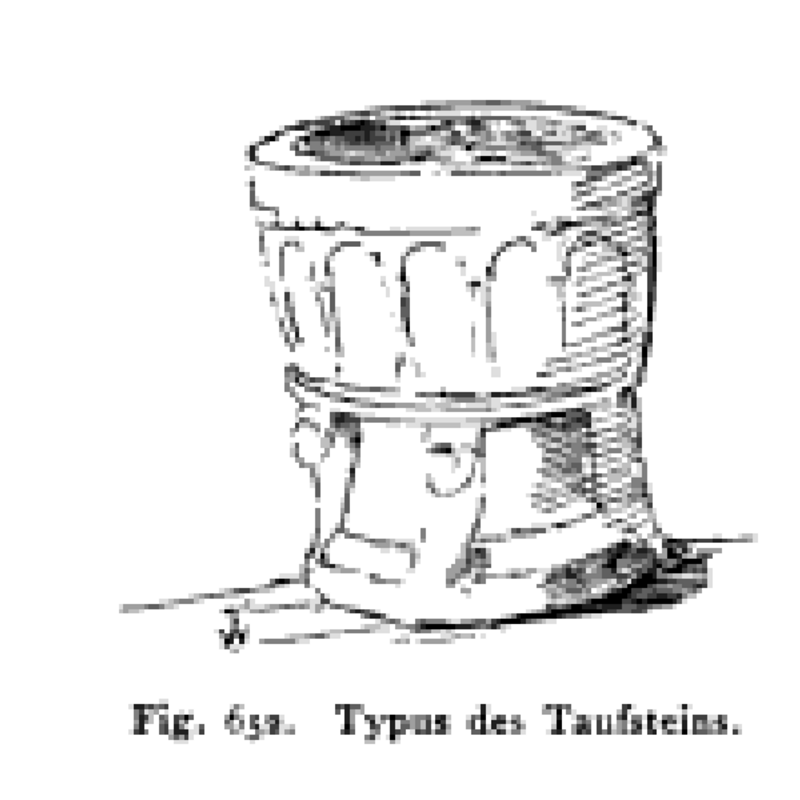
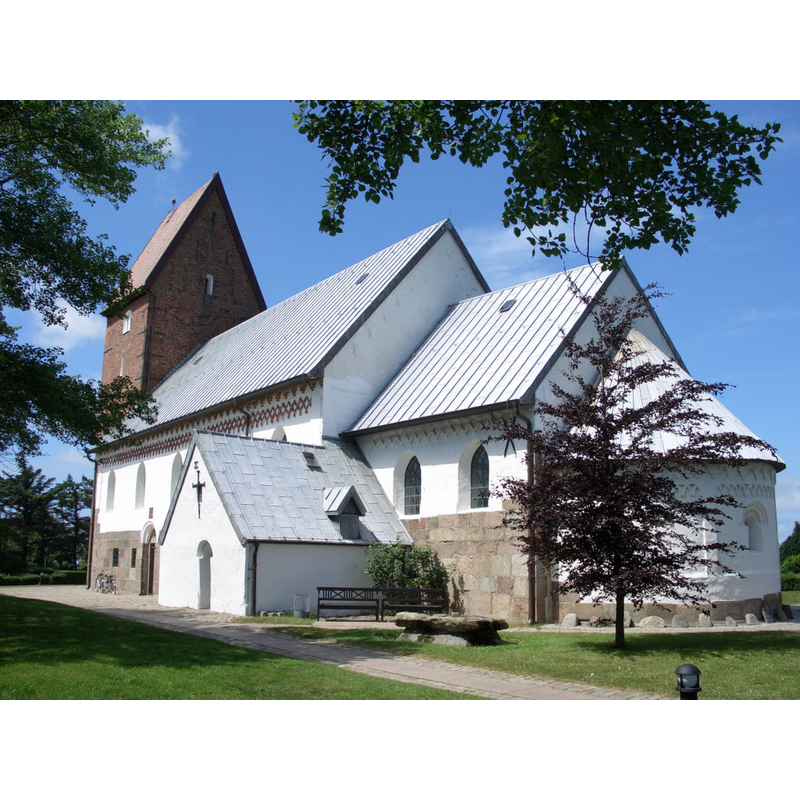
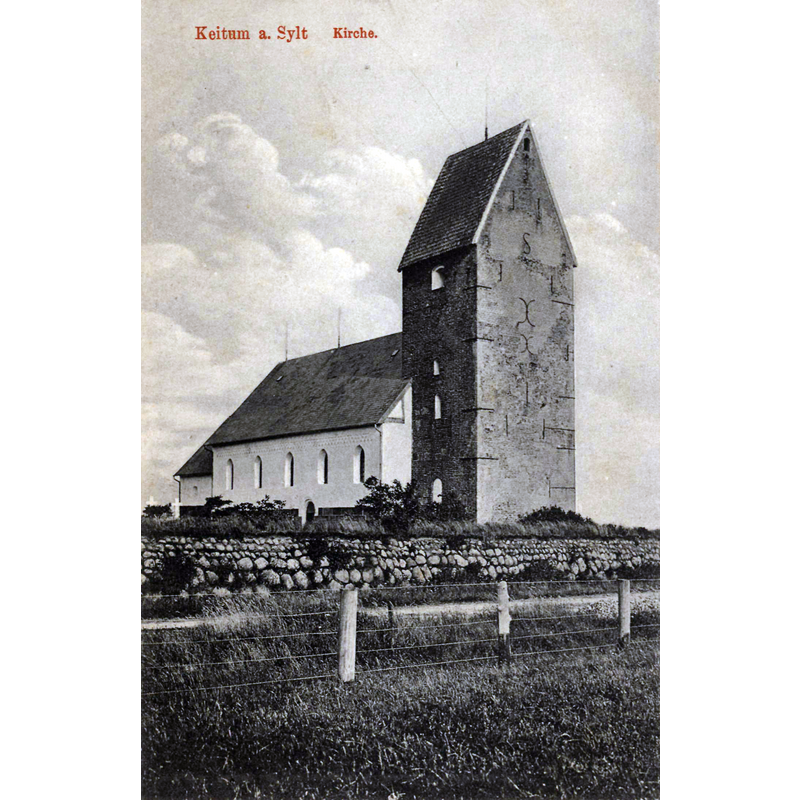
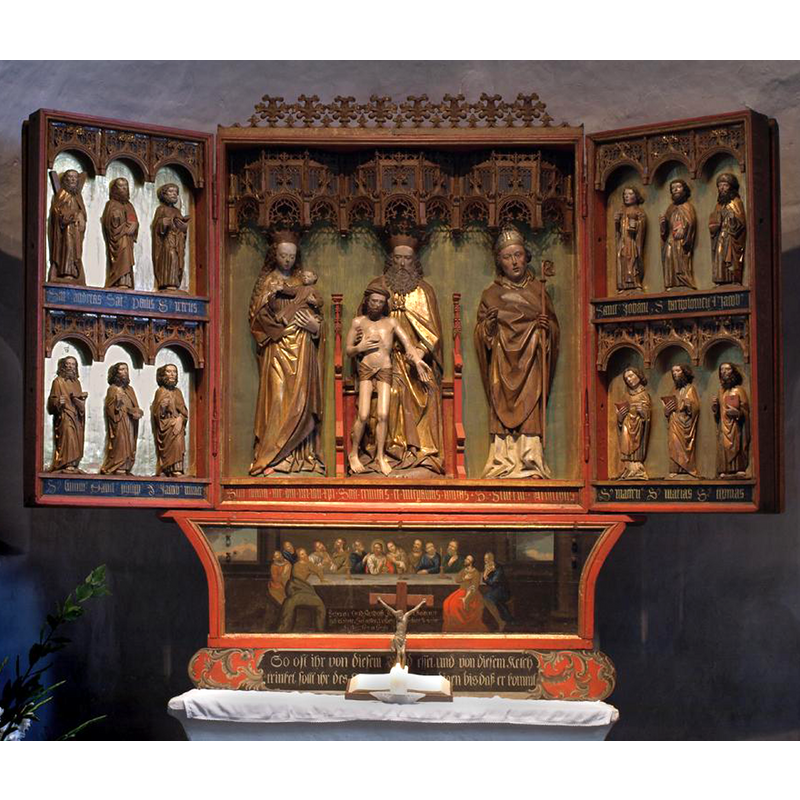
![the font is partially visible at the far [east] end, left [north] side](/static-50478a99ec6f36a15d6234548c59f63da52304e5/compressed/1140706023_compressed.png)